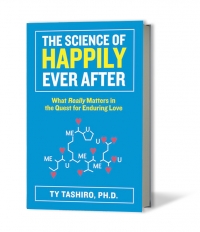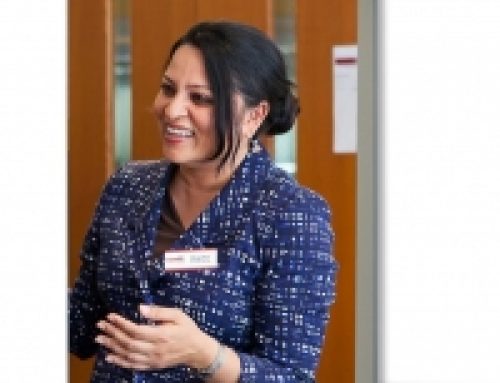Ty Tashiro Interview – What Really Matters in the Quest for Enduring Love
“The Science of Happily Ever After: What Really Matters in the Quest for Enduring Love”
Jasbina Ahluwalia interviews Ty Tashiro
A few topics Ty Tashiro addresses in this interview are:
- (3:17) Marriage Satisfaction Decline
- (5:13) Marriage is Twice as Long
- (7:36) Dating Three Wishes
- (11:07) Importance of Looks
- (14:34) Bad Boy Versus Nice Guy
- (16:40) Personality Traits: Top 3
- (22:41) Two Dating Red Flags
_____
Ty Tashiro is a relationship expert for the Discovery Network’s Fit and Health channel where he writes weekly articles about the science of love. He received a doctorate in psychology from the University of Minnesota. Ty’s research has been published in top tier academic journals, including American Psychologist and Psychological Science.
Ty is the author of the book entitled The Science of Happily Ever After: What Really Matters in the Quest for Enduring Love.
_____
(00:47): Hello everyone and welcome to Intersections Match’s Talk Radio, a monthly holistic lifestyle show focused on the continual evolution into the best versions of our authentic selves. We and our guests discuss relationships and health and wellness, each of which contributes to meaningful and fulfilling lives.
This is Jasbina, your host. I’m a former practicing lawyer and the Founder of Intersections Match, the only elite national personalized matchmaking company focused on singles of South Asian descent nationwide in the US. As a professional dating coach and matchmaker, I’m always interested in fresh perspectives from authors, researchers and experts to help me provide the best possible service for our clients.
I’m very excited to welcome author and relationship expert Ty Tashiro to our show today. Ty is a relationship expert for the Discovery Network’s Fit and Health channel where he writes weekly articles about the science of love. He received a doctorate in psychology from the University of Minnesota. Ty’s research has been published in top tier academic journals, including American Psychologist and Psychological Science.
In today’s show, we’ll be discussing Ty’s book entitled The Science of Happily Ever After: What Really Matters in the Quest for Enduring Love. Welcome to the show, Ty.
Ty Tashiro
(1:56): Hi. Thanks for having me on.
(1:59): It’s a pleasure to have you. I thought your book was very insightful. I’m wondering what led you to write the book about the science of love.
Ty Tashiro
(2:08): A lot of factors contributed to it.
I attended graduate school at the University of Minnesota. I started studying relationships there, mostly breakups, divorce and how people grow from those experiences.
One of the things that we saw was that people said they would make all kinds of positive life changes. Their friendships were better. They were doing better in their academics. There was a whole range of things.
Something that they didn’t say very often was that they would choose a better partner the next time.
If you look back at some of the things that their partners were doing, you thought it would probably be one of the top things to look at. That got me to think about it.
I had some great students when I taught at the University of Maryland. I taught a relationships class. They had such great questions about the personal relevance of how you navigate the dating scene.
I realized that there were a lot of good answers out there in the psychological research but it wasn’t always readily accessible to the people who needed it the most, which were people trying to figure it out.
_____
Marriage Satisfaction Decline
(3:17): What are some of the most shocking things that you discovered through your research?
Ty Tashiro
(3:27): There are always surprises. Some of the initial things that shock you have to do with the bad news in relationships.
One of the surprising things was how sharp the decline is in relationship satisfaction and relationship happiness early on in a marriage.
Elaborating on Marriage Satisfaction Decline.
______
Marriage is Twice as Long
(5:13): Given what you’ve said in terms of the high divorce rates and brevity of marriages, people feel that they’re making a lifelong commitment and it’s quite devastating.
Coming from a positive angle and a place of empowerment, what should people look for to find a more enduring relationship?
They want to find that relationship where they can have memories and experiences of decades, knowing that this person likes two lumps of sugar rather than one. What should they look for?
Ty Tashiro
(5:58): There are a number of things.
One is to be clear about what the task is.
I think most people know what it means to be happy in a relationship. A lifetime is a really long time.
Elaborating on Marriage is Twice as Long.
_____
Dating Three Wishes
(7:36): In your book, you say, “Singles only get three wishes when choosing a romantic partner.” I have to say that I love this.
I ask about the three essentials when it comes to our clients. I do limit those essentials to three. Tell everyone why they would be well served to be very thoughtful about those three and why they should limit it.
Ty Tashiro
(8:27): I want to say that I wish people got a lot more than three wishes. I’m not trying to be a downer by saying that there are only three.
People can find more of what they’re looking for, and the things that are most important to them, if they go with this mindset.
Elaborating on Dating Three Wishes.
______
Importance of Looks
(11:07): You have your pool to choose from. You put restrictors on it. They’re going to overlap. There could be a lot of missed opportunity.
Let’s say that someone is single and they have their three wishes. Why is it that people so often put looks and money at the top of the list when choosing a partner? What’s behind that?
Ty Tashiro
(11:50): There is good reason for it. The best of us can be prone to it.
The reason with the strongest evidence from the psychological research has to do with the idea that, for most of human history, our life expectancy was short. It was under 40 years. The chances that your partner could die at some point were relatively high.
Elaborating on Importance of Looks.
______
Bad Boy Versus Nice Guy
(14:34): Given that evolutionary backdrop, let’s talk about some dating stereotypes in our culture.
One is that nice guys finish last. Another one is that girls are attracted to bad boys. Tell us about your research with respect to that.
Ty Tashiro
(15:03): The bad boys often have a certain look to them.
- They often have a powerful build.
- They have a strong jaw.
That’s the kind of build you get from high testosterone release during adolescence.
Here, you have someone who would be great if you were looking for protection or to battle for resources.
Elaborating on Bad Boy Versus Nice Guy.
_____
Personality Traits: Top 3
(16:40): You have selfishness on one hand and compassion on the other.
What three traits do you think one would be well served to look for in a partner if they want to beat those not-so-pleasant odds and find enduring love?
Ty Tashiro
Personality Traits to Seek
- Agreeable (Kind)
- Emotional Stability
- Less Intuitive
There are a number of them. In The Science of Happily Ever After, I review nine different traits that people could look for that would improve their odds of finding a happy and stable relationship.
Let’s go with personality. In the personality chapter, I give three suggestions.
Elaborating on Personality Traits: Top 3.
_____
Two Dating Red Flags
(22:41): You mentioned emotional instability and novelty seeking.
Let’s say that someone finds themselves in a relationship where they’re seeing some potential red flags.
What are the red flags that could indicate more serious problems down the line?
Ty Tashiro
Two Dating Red Flags:
- Demand/Withdraw Pattern
- Capitalization
We’re fortunate that there are hundreds, if not thousands, of studies on relationship processes that can help us identify red flags. These are things that come up in dating relationships in longitudinal studies where they follow dating couples into their marriage.
The behaviors are pretty stable. If you see it in your dating relationship, you’re also likely to see it in your marriage. It’s not going to change.
Elaborating on Two Dating Red Flags.
______
(27:44): I really appreciate you sharing your insights with us, Ty. It’s been very interesting. Is there any last thought or take-home message that you’d like to leave our listeners with?
Ty Tashiro
(27:55): I think it can be confusing these days, with the dating scene and how fast things are changing. I’m glad there are people like you doing great work to help people out with it.
My understanding, from the people I’ve talked to over the years and the research that I’ve seen, is that people often know what the right decisions are when it comes to choosing the kind of partner that would lead to a happy and stable relationship.
I think on some intellectual level, a lot of people naturally understand that. But we don’t always listen to it.
The best thing that people can do is, in between relationships, use that time to evaluate where you’ve been, the mistakes that you make when choosing partners and then look to some good information.
It could be books or radio shows about how they can change those patterns and choose people that would be good for them.
I think that in between relationships is really a time for people to do some good thinking.
(29:08): I love that. It dovetails with how every relationship becomes meaningful, whether it works out or not. You can take the learnings from that and bring it to the next relationship. I love that mindset.
Ty, if our listeners want to reach you, can you share your website with them?
Ty Tashiro
(29:32): Yes. It’s TyTashiro.net. They can find out more about The Science of Happily Ever After there. They can also find me on social media if they’d like to connect on Twitter or Facebook.
(29:52): That’s wonderful. Thanks, Ty. It’s been a pleasure to have you on.
Ty Tashiro
(29:56): It was great to talk with you.
(29:58): In case you joined us late or would like to share this show with people in your life, I’d like to remind you that today’s radio show will be archived and available as a podcast on Intersections Match’s website, which is www.IntersectionsMatch.com. I can be reached at jasbina@intersectionsmatch.com.
I appreciate you hanging out with us. Do email me with topics you’d like discussed in future shows. Make sure to join us for next month’s show. Goodnight, everyone.
_____
Tell Us:
What advice from Ty Tashiro has made a lasting impression on you? Share with us in the comments section.
_____





